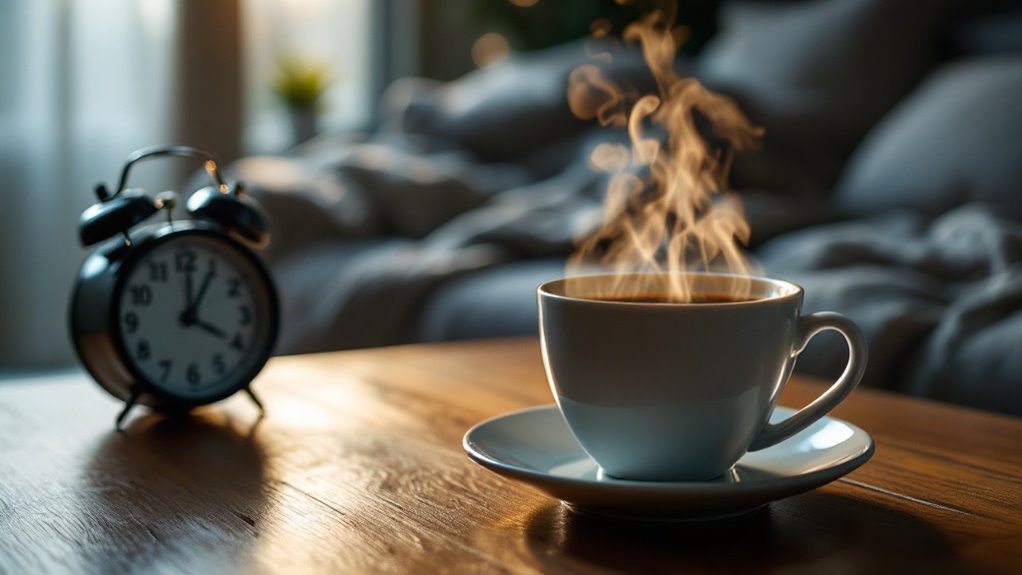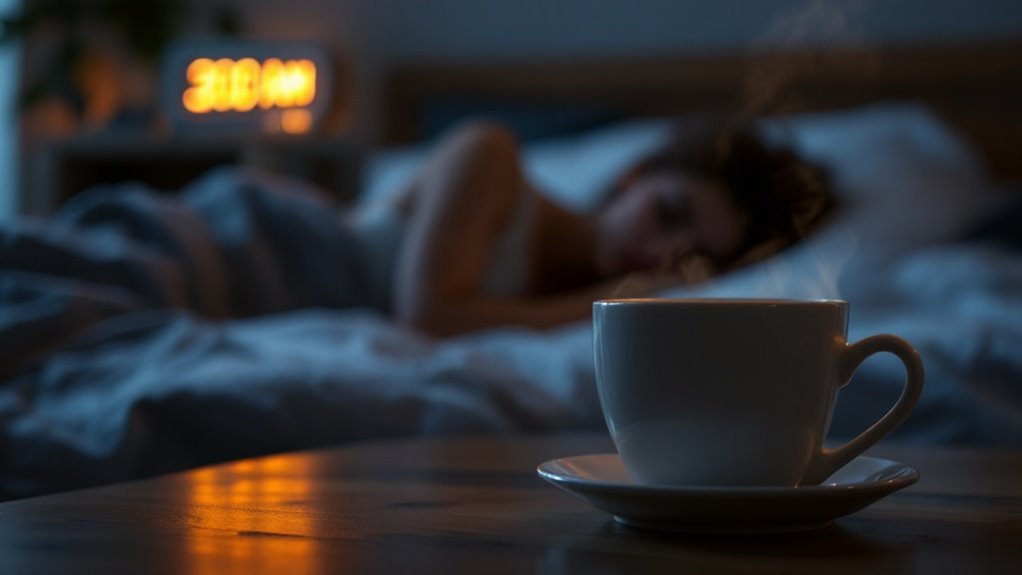



You've probably felt it before—that late-afternoon coffee giving you a second wind, only to leave you staring at the ceiling hours later. Caffeine's ability to block adenosine, the chemical that signals sleepiness, can trick your brain into staying alert when it shouldn't. But how long does this effect last, and what does it mean for your sleep quality? The answer isn't the same for everyone, and factors like age, metabolism, and timing play a surprising role. If you've ever wondered why that evening espresso keeps you up, there's more to uncover about caffeine's hidden impact on your nights.
Key Takeaways
- Caffeine in coffee blocks adenosine receptors, delaying sleep onset and reducing deep sleep, especially when consumed within 6 hours of bedtime.
- Consuming caffeine 6 hours before bed can reduce total sleep time by 41 minutes and disrupt sleep quality for 88% of people.
- Caffeine's effects last 4–6 hours, but full metabolism takes up to 10 hours, making late-day coffee consumption harmful to sleep.
- FDA recommends limiting daily caffeine to 400 mg; exceeding this can worsen sleep disturbances and create a cycle of poor sleep.
- Genetic and lifestyle factors, like slower metabolism in older adults or pregnancy, can prolong caffeine's effects and increase sleep disruption.
How Caffeine Impacts Sleep Quality
Caffeine disrupts sleep quality by blocking adenosine receptors, which reduces deep, slow-wave sleep and delays sleep onset. When you consume caffeine, even six hours before bedtime, it can cut your total sleep time by 41 minutes and increase wakefulness during the night. Coffee or other caffeinated drinks in the afternoon or evening interfere with your sleep-wake cycle, with 88% of people reporting sleep problems after late-day consumption. Over time, relying on caffeine to counteract daytime fatigue can worsen insomnia symptoms, creating a cycle of poor sleep and increased caffeine use. To improve sleep quality, limit caffeine intake, especially within six hours of bedtime. Reducing consumption can help restore natural sleep patterns and minimize disturbances, leading to more restful nights.
The Science Behind Caffeine and Adenosine
Adenosine, a naturally occurring compound in the brain, plays a central role in regulating sleep by signaling when it's time to rest. As you stay awake, adenosine builds up in your central nervous system, binding to adenosine receptors and promoting sleepiness. However, caffeine blocks these receptors, preventing adenosine from signaling your brain to prepare for sleep. By mimicking adenosine's structure, caffeine binds to the receptors without activating them, keeping you alert. This disruption of the sleep-wake cycle can delay sleep onset and lead to reduced total sleep time. Even hours after consumption, caffeine's effects on sleep taken can persist, impacting your ability to fall asleep and stay asleep. Understanding how caffeine blocks adenosine helps explain its interference with your natural sleep processes.
How Long Caffeine Stays in Your System
While caffeine can keep you alert and focused, its effects don't disappear immediately after consumption. The half-life of caffeine is typically 4–6 hours, meaning it takes this long for your body to eliminate half of the caffeine you consumed. However, the time it takes to fully metabolize caffeine can extend up to 10 hours. If you consume caffeine close to bedtime, even six hours prior, it may still disrupt your sleep. The rate at which you metabolize caffeine varies depending on individual factors like genetics, liver function, and lifestyle habits. For example, nicotine use can markedly shorten caffeine's half-life. Understanding how long caffeine stays in your system helps you manage its impact on your sleep and daily routine.
Optimal Timing for Caffeine Consumption
To minimize sleep disruption, avoid caffeine at least 8 hours before bedtime, as its effects can persist for up to 6 hours. Caffeine's half-life of 4–6 hours means even afternoon consumption can reduce sleep quality and total sleep time. For most people, cutting off caffeine by 2–3 p.m. helps maintain a healthy sleep-wake cycle.
Caffeine Half-Life Impact
Because caffeine has a half-life of 4–6 hours, consuming it too late in the day can interfere with your sleep. The caffeine half-life means half the amount of caffeine you consume remains in your system for hours, potentially delaying your ability to fall asleep and reducing total sleep time. To minimize effects on sleep, avoid caffeine at least 6–8 hours before bedtime. Studies show that consuming caffeine even 6 hours before bedtime can reduce total sleep by 41 minutes. The time of day you consume caffeine daily matters—aim to limit intake to early afternoon (2–3 p.m.) to prevent sleep disruption. Factors like nicotine or pregnancy can alter caffeine's half-life, so adjust your intake based on your metabolism and lifestyle.
Bedtime Caffeine Avoidance
Although caffeine can enhance alertness and focus, consuming it too close to bedtime can substantially disrupt your sleep. Research shows that caffeine consumption within 6 hours of bedtime reduces total sleep time by 41 minutes, delays sleep onset by 24.1 minutes, and decreases sleep efficiency. Even late afternoon caffeine intake can impair slow-wave sleep, a critical restorative phase. To minimize sleep disruption, avoid caffeine at least 6 hours before bedtime, with some individuals needing 8-10 hours. Caffeine taken 3 hours before sleep increases wake time by 27.6 minutes, further degrading sleep quality. For ideal sleep-wake cycle alignment, limit caffeine to mornings or early afternoons, ideally before 2-3 p.m. This timing helps prevent interference with sleep onset and guarantees better overall sleep quality.
Safe Daily Limits for Caffeine Intake
While caffeine is widely consumed, it's important to stay within safe daily limits to avoid negative effects on sleep and overall health. For healthy adults, the FDA recommends a maximum daily caffeine intake of 400 mg, roughly equivalent to four cups of coffee. Pregnant or nursing women should limit their caffeine intake to 200 mg per day, while adolescents are advised to consume no more than 100 mg daily. Be mindful of the caffeine content in energy drinks and other sources, as they can quickly push you over these limits. A standard cup of coffee contains about 80-100 mg of caffeine, but this can vary. Exceeding these guidelines may disrupt sleep or cause other health issues, so monitor your daily caffeine intake carefully.
Caffeine Tolerance and Its Effects on Sleep
Regular caffeine consumption can lead to tolerance, reducing its effectiveness in promoting alertness and potentially increasing your reliance on it to combat fatigue. Chronic caffeine consumption may alter your sleep architecture, reducing deep sleep and increasing sleep fragmentation, which can impair overall sleep quality. Over time, your body adapts to caffeine, diminishing its alertness-promoting effects and requiring larger doses to achieve the same results. This cycle can worsen daytime fatigue and disrupt your sleep if caffeine is consumed late in the day. Additionally, caffeine withdrawal can cause sleepiness, further complicating your sleep patterns. Studies, such as one by Lara et al. (2019), highlight how tolerance develops, making it harder to balance caffeine's benefits with its impact on sleep. Managing intake is key to minimizing these effects.
Alternatives to Caffeine for Energy Boosts
If you're looking to reduce your caffeine intake, there are several evidence-based strategies to boost energy without relying on stimulants. Prioritize good nights of sleep by maintaining a consistent sleep schedule and ensuring adequate sleep duration to avoid sleep deprivation. Staying asleep through the night improves daytime alertness. Engage in regular physical activity, like brisk walking, to naturally enhance energy levels throughout the day. Stay hydrated and eat balanced meals with whole grains, lean proteins, and healthy fats to sustain energy. Take short power naps (up to 20 minutes) to restore alertness without disrupting nighttime sleep. Increase morning light exposure to regulate your circadian rhythm, helping you stay alert and reducing the effects of fatigue. These habits support energy without compromising sleep quality.
Signs Caffeine Is Disrupting Your Sleep
Because caffeine can stay in your system for hours, consuming it late in the day might make it harder to fall asleep or stay asleep. If you drink multiple cups of coffee in the early evening, you may notice poor sleep quality, such as difficulty going to bed or waking up frequently during the night. A study also found that caffeine consumed even six hours before bedtime can reduce total sleep time by over an hour, highlighting its disruptive effects. Feeling groggy or unrested in the morning, despite adequate sleep, could indicate caffeine on sleep stages. Increased daytime sleepiness or relying on caffeine to stay alert may further suggest its lingering impact. Pay attention to these signs to determine if caffeine is affecting your rest.
How Age and Metabolism Affect Caffeine Processing
As you age, your body's ability to process caffeine slows down, which can lead to prolonged effects and greater sleep disruption. Older adults often experience slower caffeine metabolism due to age-related declines in liver function, reducing caffeine clearance and increasing sensitivity to its effects. Genetic variations in the CYP1A2 enzyme also play a role, as some individuals metabolize caffeine faster or slower than average. Nicotine use can speed up caffeine metabolism, shortening its half-life in smokers. Conversely, pregnant individuals metabolize caffeine at half the normal rate, extending its duration and raising the risk of sleep disturbances. These factors highlight how age, genetics, and lifestyle influence caffeine processing, making its impact on sleep highly individualized.
Tips to Reduce Caffeine's Impact on Sleep
To minimize caffeine's impact on sleep, it's important to time your consumption carefully. Avoid caffeinated beverages at least six hours before bedtime, as caffeine can reduce total sleep time by over an hour. Gradually reduce your caffeine intake to improve sleep quality while minimizing withdrawal symptoms like headaches. Track your caffeine consumption and sleep patterns to identify the latest time you can consume caffeine without disrupting sleep. Replace afternoon and evening caffeinated beverages with decaffeinated options or herbal teas to reduce sleep disturbances. Limit your daily caffeine intake to 400 mg or less, as recommended by the FDA, to avoid overstimulation and sleep disruption. These strategies can help you maintain better sleep quality while still enjoying caffeine in moderation.
Disclosure: As an Amazon Associate, I earn from qualifying purchases.






